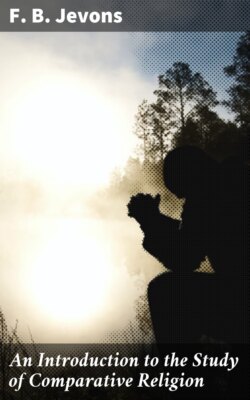Читать книгу An Introduction to the Study of Comparative Religion - F. B. Jevons - Страница 9
На сайте Литреса книга снята с продажи.
SACRIFICE
ОглавлениеTable of Contents
Prayer and sacrifice historically go together, and logically are indissoluble. Sacrifice, whether realised in an offering dedicated or in a sacrificial meal, is prompted by the worshippers' desire to feel that they are at one with the spirit worshipped. That desire manifests itself specially on certain regularly occurring occasions (harvest, seed time, initiation) and also in times of crisis. At harvest time the sacrifices or offerings are thank-offerings, as is shown by the fact that a formula of thanksgiving is employed. Primitive prayer does not consist solely in petitions for favours to come; it includes thanksgiving for blessings received. Such thanksgivings cannot by any possibility be twisted into magic.
Analogous to these thanksgivings at harvest time is the solemn eating of first-fruits amongst the Australian black fellows. If this solemn eating is not in Australia a survival of a sacramental meal, in which the god and his worshippers were partakers, it must be merely a ceremony whereby the food, which until it is eaten is taboo, is "desacralised." But, as a matter of fact, such food is not taboo to the tribe generally; and the object of the solemn eating cannot be to remove the taboo and desacralise the food for the tribe.
If the harvest rites or first-fruit ceremonials are sacrificial in nature, then the presumption is that so, too, are the ceremonies performed at seed time or the analogous period.
At initiation ceremonies or mysteries, even amongst the Australian black fellows, there is evidence to show that prayer is offered; and generally speaking we may say that the boy initiated is admitted to the worship of the tribal gods.
The spring and harvest customs are closely allied to one another and may be arranged in four groups: (1) In Mexico they plainly consist of the worship of a god—by means of sacrifice and prayer—and of communion. (2) In some other cases, though the god has no proper or personal name, and no image is made of him, "the new corn," Dr. Frazer says, "is itself eaten sacramentally, that is, as the body of the corn spirit"; and it is by this sacramental meal that communion is effected or maintained. (3) In the harvest customs of northern Europe, bread and dumplings are made and eaten sacramentally, "as a substitute for the real flesh of the divine being"; or an animal is slain and its flesh and blood are partaken of. (4) Amongst the Australian tribes there is a sacramental eating of the totem animal or plant. Now, these four groups of customs may be all religious (and Dr. Frazer speaks of them all as sacramental) or all magical; or it may be admitted that the first three are religious, and maintained that the fourth is strictly magical. But such a separation of the Australian group from the rest does not commend itself as likely; further, it overlooks the fact that it is at the period analogous to harvest time that the headman eats solemnly and sparingly of the plant or animal, and that at harvest time it is too late to work magic to cause the plant or animal to grow. The probability is, then, that both the Australian group and the others are sacrificial rites and are religious.
Such sacrificial rites, however, though felt to be the means whereby communion was effected and maintained between the god and his worshippers, may come to be interpreted as the making of gifts to the god, as the means of purchasing his favour, or as a full discharge of their obligations. When so interpreted they will be denounced by true religion. But though it be admitted that the sacrificial rite might be made to bear this aspect, it does not follow, as is sometimes supposed, that it was from the outset incapable of bearing any other. On the contrary, it was, from the beginning, not only the rite of making offerings to the god but, also, the rite whereby communion was attained, whereby the society of worshippers was brought into the presence of the god they worshipped, even though the chief benefits which the worshippers conceived themselves to receive were earthly blessings. It is because the rite had from the beginning this potentiality in it that it was possible for it to become the means whereby, through Christ, all men might be brought to God … 175–210
